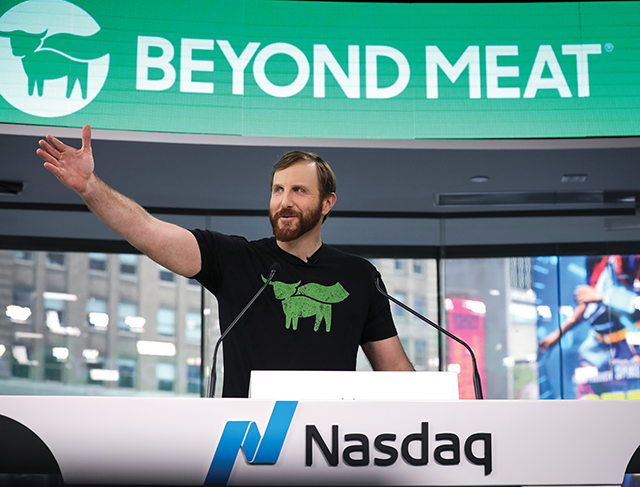Investors lost some of their taste for Beyond Meat Inc. after a week in which the plant-based burger-maker delivered mixed second quarter results and announced the sale of new shares.
Beyond Meat’s stumble comes as competition in the alternative meat market is heating up.
Tyson Foods Inc., the nation’s largest meat producer, and Nestlé, the world’s biggest food company, are both rolling out products aimed at what business insiders call “flexetarians” — carnivores looking for healthier alternatives to meat.
“It used to be these two major players,” said Darren Seifer, a food and beverage analyst at market research firm NPD Group Inc., pointing to Beyond Meat and meat substitute startup Impossible Foods Inc. “Now you see the likes of Tyson getting into the fray.”
Shares of El Segundo-based Beyond Meat had surged to nearly $240 last week, up from $25 during its debut offering three months ago. But Beyond’s share price plunged below $200 after the July 29 earnings call.
Beyond Meat Founder and Chief Executive Ethan Brown reported that his company had a $9.4 million loss in the second quarter of 2019, compared to a $7.4 million loss the three months prior.
The bigger damper on share price was Beyond Meat’s announcement that insiders including Brown and Chief Financial Officer Mark Nelson were selling off a combined 3 million shares of common stock. Brown is selling 39,130 shares and Nelson 55,530 shares — a move that will bring the executives millions of dollars.
The company also offered 250,000 new shares of stock for sale. Beyond Meat said it will use proceeds from the offering to increase production and supply capabilities. Some of the funds will also go toward marketing and promotional efforts.
Citing regulatory requirements, Brown and other company officials didn’t comment on the offering.
Ramping up
The company has been pumping funds into expanding production and boosting distribution.
In 2017 and 2018, Beyond Meat ran into shortages as demand outstripped supply. But Brown said in a call with investors that the company hadn’t experienced any similar problems since then. Still he warned, “There will be, from time to time, some very short-lived outages on a particular product as we switch from one platform to another.”
NPD’s Seifer said Beyond Meat is likely to have to compete harder in coming years as the plant-based burger market grows along with the market for other alternative protein products.
NPD found in the year ending in May about two-thirds of all growth in the plant-based burger sector had come from Beyond and Impossible. But competition is heating up.
In April, Nestlé launched in Europe a plant-based burger made of soy and wheat under the brand Garden Gourmet. The Swiss food producer will bring a version to the United States this fall under the Sweet Earth brand, a Moss Landing-based company Nestlé acquired in 2017.
Dubbed the Awesome Burger, Nestlé’s meatless contender will be made of yellow pea and other ingredients that help the patty mimic the texture of real meat. It will come in organic and nonorganic versions.
Tyson Foods plans to introduce hybrid patties made of pea protein and Angus beef this fall under the Raised & Rooted brand, expanding its plant-based offerings.
Brown said bring it on.
“It’s a $1.4 trillion industry,” Brown told investors. “Getting more players in that are willing to market and tell the story, I think, is really important.”
Seifer points out the meat-substitute market is just a sliver of the broader meat market, and there’s plenty of room for growth.
Brown said that as Beyond Meat expands, it’s committed to staying away from genetically modified ingredients as part of its strategy as new entrants come into the market.
“We’ve got a tremendous lead in terms of distribution, in terms of brand awareness and a bigger innovation,” Brown said. “It is only going to get better.”
Manufacturing, retail and trade reporter Rachel Uranga can be reached at [email protected] or (323) 556-8351. Follow her on Twitter @racheluranga.

